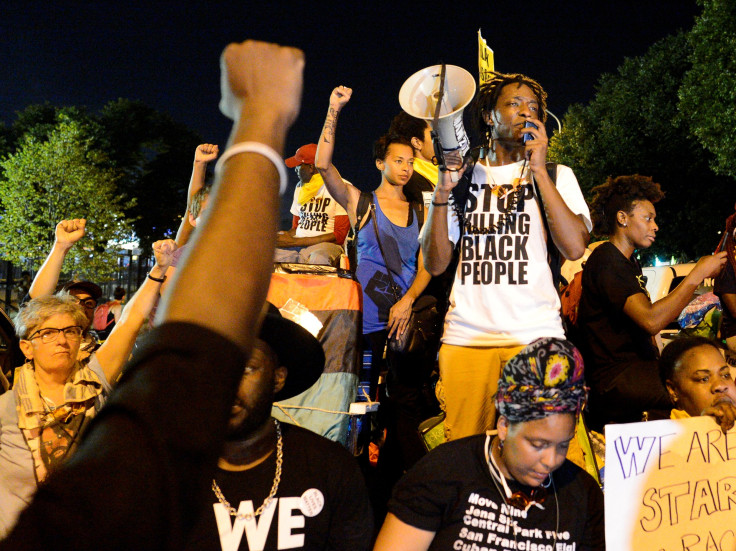Is Black Lives Matter Racist? Philadelphia Chapter Bans Non-Blacks From Meeting

Black Lives Matter Philadelphia, one of nearly 40 local chapters in the national Black Lives Matter Network, scheduled a meeting on April 15 to discuss projects and activities the group was planning for 2017. But despite labeling the gathering an "open" meeting, the group banned non-black people from attending.
BLM Philly posted a notice about the meeting on its Facebook page with information about the meeting's location and timing, as well as a notice that "BLM Philly is a Black only space." This prompted one Twitter user to ask the group if its meetings were black only or if all of its activities were as well. "Our meetings are black centered," the group's Twitter account replied. In response to another user who asked, "you mean only black people can come to the meeting?" BLM Philly answered simply: "Yes."
— BLM Philly (@BLMPhilly) April 3, 2017
In response to critical tweets, including some pointing out Dr. Martin Luther King Jr. worked with whites, the group clarified its stance, although it did not back off the ban on all non-black attendees at the upcoming meeting.
If you identify as a person of the African Diaspora You can attend our meetings and become a member. If not you can support us in other ways https://t.co/GTCkKVC7xV
— BLM Philly (@BLMPhilly) April 3, 2017
Many Twitter users piled on BLM Philly for blocking people from their meetings based on racial grounds, but many others, including users who identified as white, came to the organization's defense. The conversation quickly turned to what it means to be an ally, and if white people attending meetings would derail the proceedings. One user who identified as white explained that white users would have a lot of questions at the meeting, and wouldn't be shy about asking them.
So the mtg time becomes about answering your questions. And then the next mtg another person comes with the same basic questions about race.
— RealPA (@PhillyResistNow) April 3, 2017
Other users suggested that interested white people should find and join a local Showing Up For Racial Justice group. SURJ is a nationwide organization that seeks to organize white people to fight against oppression of minority groups.
The existence of groups like SURJ is an acknowledgment by many social activists that racial tensions within activist groups can prevent progress. It also represents a shift in how the society at large thinks about race.
In previous generations, many of which saw state-sponsored segregation firsthand, the goal of social movements was often multicultural and multi-racial integration. But in recent years, temporary divisions along racial lines has increasingly been seen as a way to bolster the voices of oppressed groups and prevent privileged groups from dominating conversations.
In 2015, New York Magazine profiled a New York elementary school that went so far as to institute weekly meetings where students were segregated by race in order to discuss racial identity. The goal was to "initiate a cultural upheaval, one that would finally give students of color a sense of equal ownership in the community," the article pointed out.
While this view of racial identity has received growing acceptance in recent years, many white liberals questioned such a race-based approach to politics after the election of President Donald Trump. Many commentators argued Trump's election represented the triumph of "white identity politics," which was fostered by decades of identity politics that whites believed excluded them. In the days after the election, Columbia professor Mark Lilla, who is white, published a widely shared and critiqued essay in the New York Times that argued liberalism was failing because it had become fractured along the fault lines of identity.
"We need a post-identity liberalism," Lilla wrote. "Such a liberalism would concentrate on widening its base by appealing to Americans as Americans and emphasizing the issues that affect a vast majority of them."
Of course, minorities face vastly different issues than whites, which is presumably why BLM Philly wanted their planning meeting to be black only: so it could address the concerns of black people specifically.
BLM Philly did not immediately respond to a request for comment.
Writing about the meeting controversy on Afropunk.com Tuesday, writer and editor Hari Ziyad argued getting angry about being told how to best help someone means you aren't really interested in helping them in the first place.
"If you claim to want to help someone, and they explain to you that your presence is unhelpful and there are better ways to assist, yet you insist on doing it your way, you're not truly interested in their cause at all," Ziyad wrote. "This just goes to show how necessary it is to have Black only spaces in the first place, as it is clear that many 'allies' cannot look past their own bubble far enough not to get in the way of what needs to be done."
© Copyright IBTimes 2024. All rights reserved.












